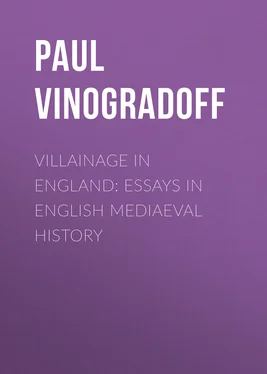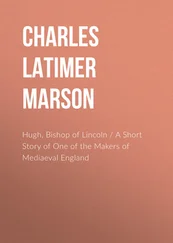Paul Vinogradoff - Villainage in England - Essays in English Mediaeval History
Здесь есть возможность читать онлайн «Paul Vinogradoff - Villainage in England - Essays in English Mediaeval History» — ознакомительный отрывок электронной книги совершенно бесплатно, а после прочтения отрывка купить полную версию. В некоторых случаях можно слушать аудио, скачать через торрент в формате fb2 и присутствует краткое содержание. Жанр: foreign_prose, Юриспруденция, История, foreign_edu, foreign_antique, на английском языке. Описание произведения, (предисловие) а так же отзывы посетителей доступны на портале библиотеки ЛибКат.
- Название:Villainage in England: Essays in English Mediaeval History
- Автор:
- Жанр:
- Год:неизвестен
- ISBN:нет данных
- Рейтинг книги:4 / 5. Голосов: 1
-
Избранное:Добавить в избранное
- Отзывы:
-
Ваша оценка:
- 80
- 1
- 2
- 3
- 4
- 5
Villainage in England: Essays in English Mediaeval History: краткое содержание, описание и аннотация
Предлагаем к чтению аннотацию, описание, краткое содержание или предисловие (зависит от того, что написал сам автор книги «Villainage in England: Essays in English Mediaeval History»). Если вы не нашли необходимую информацию о книге — напишите в комментариях, мы постараемся отыскать её.
Villainage in England: Essays in English Mediaeval History — читать онлайн ознакомительный отрывок
Ниже представлен текст книги, разбитый по страницам. Система сохранения места последней прочитанной страницы, позволяет с удобством читать онлайн бесплатно книгу «Villainage in England: Essays in English Mediaeval History», без необходимости каждый раз заново искать на чём Вы остановились. Поставьте закладку, и сможете в любой момент перейти на страницу, на которой закончили чтение.
Интервал:
Закладка:
Although the tenants in ancient demesne are admitted to use the 'little writ of right' only, their court made it go a long way; and in fact, all or almost all the real actions of the common law had their parallel in its jurisdiction. The demandant, when appearing in court, made a protestation to sue in the nature of a writ of mort d'ancestor or of dower 168 168 Y.B., 11/12 Edw. III, 325 (Rolls Ser.).
or the like, and the procedure varied accordingly, sometimes following very closely the lines of the procedure in the high courts, and sometimes exhibiting tenacious local usage or archaic arrangements 169 169 I shall have to speak of the constitution and usages of the court in another chapter.
.
Procedure of revision.
Actions as to personal estate could be pleaded without writ, and as for the crown pleas they were reserved to the high courts 170 170 Actions on statutes could not be pleaded in ancient demesne because, it was explained, the tenantry not being represented in parliament, were no parties in framing the statute; Viner, Abr. Anc. Dem. E. 19. Another explanation is given in Y.B., H. 8 Edw. II, p. 265.
. But even in actions regarding the soil a removal to these latter was not excluded 171 171 As a matter of course, any question as to whether a manor was ancient demesne, and whether a particular tenement was within the jurisdiction of it, could be decided only in the high courts.
. Evocation to a higher court followed naturally if the manorial court refused justice and such removal made the land frank fee 172 172 Viner, Abr., I. 21.
. The proceedings in ancient demesne could be challenged, and thereupon a writ of false judgment brought the case under the cognizance of the courts of common law. If on examination an error was found, the sentence of the lower tribunal was quashed and the case had to proceed in the higher 173 173 Y.B., H. 3 Edw. III, 29: ' Caunt : Si le jugement soit une foitz revers, la court auncien demesne ad perdu conusance de ce ple a touts jours.'
. Instances of examination and revision are frequent in our records 174 174 Stoneleigh Reg.: 'Item si contingat quod error sit in iudiciis eorum et pars ex eorum errore gravetur contra consuetudines, pars gravata habebit breve Regis, ad faciendum venire recordum et processum inter partes factos coram justiciariis domini Regis de Banco; qui justiciarii inspecto recordo et processu quod erratum est in processu iusto iudicio emendabunt et ipsos sokemannos propter errorem et falsum iudicium secundum quantitatem delicti ad multam condempnabunt.'
. The examination of the proceedings by the justices was by no means an easy matter, because they were constantly confronted by appeals to the custom of the manor and counter appeals to the principles of the common law of England. It was very difficult to adjust these conflicting elements with nicety. As to the point of fact, whether an alleged custom was really in usage or not, the justices had a good standing ground for decision. They asked, as a rule, whether precedents could be adduced and proved as to the usage 175 175 Bract. Note-book, 834: 'Et illi de curia qui veniunt quesiti, si unquam tale factum fuit judicium in prefata curia, et quod ostendant exemplum, et nichil inde ostendere possunt, nec exemplum nec aliud.'
; they allowed a great latitude for the peculiarities of customary law; but the difficulty was that a line had to be drawn somewhere 176 176 Y.B., 11/12 Edw. III, p. 325 (Rolls Ser.): ' Stonore : Dit qe toutz les excepcions poent estre salve par usage del manoir forspris un, cest a dire qe la ou il egarde seisine de terre par defalte apres defalte la ou le tenant avait attourne en court qe respoundi pur lui.' Cf. Y.B., H. 3 Edw. III, 29, and T. 3 Edw. III, 29.
. This procedure of revision on the whole is quite as important a manifestation of the freehold qualities of privileged villainage as pleading by writ. Men holding in pure villainage also had a manorial court to go to and to plead in, but its judicial organisation proceeded entirely from the will and power of the lord, and it ended where his will and power ended; there was no higher court and no revision for such men. The writ of false judgment in respect of tenements in ancient demesne shows conclusively that the peculiar procedure provided for the privileged villains was only an instance and a variation of the general law of the land, maintaining actionable rights of free persons. And be it again noted, that there was no sort of difference as to revision between those manors which were in the actual possession of the crown and those which were out of it 177 177 Bract. Note-book, pl. 834 and 1122 concern the royal manors of Havering and Kingston.
. Revision and reversal were provided not as a complement to the legal protection of the tenant against the lord, but as a consequence of that independent position of the tenant as a person who has rights against all men which is manifested in the parvum breve 178 178 I say against all men, because in the case of a stranger's interfering with the privileged villain's rights, it was for him to prove any exemption, e.g. conveyance by charter, which would take the matter out of the range of the manorial court.
. It is not without interest to notice in this connexion that the parvum breve is sometimes introduced in the law books, not as a restriction put upon the tenant, nor as the outcome of villainage, but as a boon which provides the tenant with a plain form of procedure close at hand instead of the costly and intricate process before the justices 179 179 Britton, ii. 13: 'Et pur ceo qe nous voloms qe ils eyent tele quiete, est ordeyne le bref de droit clos pledable par baillif del maner de tort fet del un sokeman al autre, qe il tiegne les plaintifs a droit selom les usages del maner par simples enquestes.'
.
Breve de 'Monstraverunt'.
If protection against the lord had been the only object of the procedure in cases of ancient demesne, one does not see why there should be a 'little writ' at all, as there was a remedy against the lord's encroachments in the writ of 'Monstraverunt,' 180 180 Natura brevium, f. 4 b (ed. Pynson).
pleaded before the king's justices. As it is, the case of disseisin by the lord, to whom the manor had come from the crown, was treated simply as an instance of disseisin, and brought under the operation of the writ of right, while the 'Monstraverunt' was restricted to exaction of increased services and change of customs 181 181 Stoneleigh Reg.: 'Si dominus a sokemanis tenentibus suis exigat alias consuetudines quam facere consueuerunt quum manerium fuit in manibus progenitorum Regis eos super hoc fatigando et distringendo, prefati tenentes habent recuperare versus dominum et balliuos suos per breve Regis quod vocatur Monstraverunt nobis homines de soka de Stonle,' etc.
. The latter writ was a very peculiar one, in fact quite unlike any other writ. The common-law rule that each tenant in severalty has to plead for himself did not apply to it; all join for saving of charges, albeit they be several tenants 182 182 Viner, Abr. Anc. Dem. C 2 , 3.
. What is more, one tenant could sue for the rest and his recovery profited them all; on the other hand, if many had joined in the writ and some died or withdrew, the writ did not abate for this reason, and even if but one remained able and willing to sue he could proceed with the writ 183 183 Fitzherbert, Abr. Monstraverunt, 5 (P. 19, Edw. III): ' Seton : Cest un cas a par luy en cest breue de Monstrauerunt qe un purra sue pur luy e tous les autres del ville tout ne soient pas nosmes en le breve e par la suite de un tous les autres auront auantage et cesty qe vient purra estre resceu e respondra par attourne pur touts les auters coment qe unque ne resceu lour attournement; issint qe cest suit ne breue nest semblable a auter.'
. These exceptional features were evidently meant to facilitate the action of humble people against a powerful magnate 184 184 As it was the peasants had the greatest difficulty in conducting these cases. In 1294 some Norfolk men tried to get justice against Roger Bigod, the celebrated defender of English liberties. They say that they have been pleading against him for twenty years, and give very definite references. The jury summoned declares in their favour. The earl opposes them by the astonishing answer that they are not his tenants at all. It all ends by the collapse of the plaintiffs for no apparent reason; they do not come into court ultimately, and the jurors plead guilty of having given a false verdict; see App. VII. In the case of the men of Wycle against Mauger le Vavasseur, to which I have referred several times, the trial dragged on for five years; the court adjourned the case over and over again; the defendant did not pay the slightest attention to prohibitions, but went on ill-treating the tenantry. At last he carried off a verdict in his favour; but the management of the trial certainly casts much suspicion on it. Cf. Placitorum Abbreviatio, 303.
. But it seems to me that the deviation from the rules governing writs at common law is to be explained not only by the general aim of the writ, but also by its origin.
Интервал:
Закладка:
Похожие книги на «Villainage in England: Essays in English Mediaeval History»
Представляем Вашему вниманию похожие книги на «Villainage in England: Essays in English Mediaeval History» списком для выбора. Мы отобрали схожую по названию и смыслу литературу в надежде предоставить читателям больше вариантов отыскать новые, интересные, ещё непрочитанные произведения.
Обсуждение, отзывы о книге «Villainage in England: Essays in English Mediaeval History» и просто собственные мнения читателей. Оставьте ваши комментарии, напишите, что Вы думаете о произведении, его смысле или главных героях. Укажите что конкретно понравилось, а что нет, и почему Вы так считаете.












